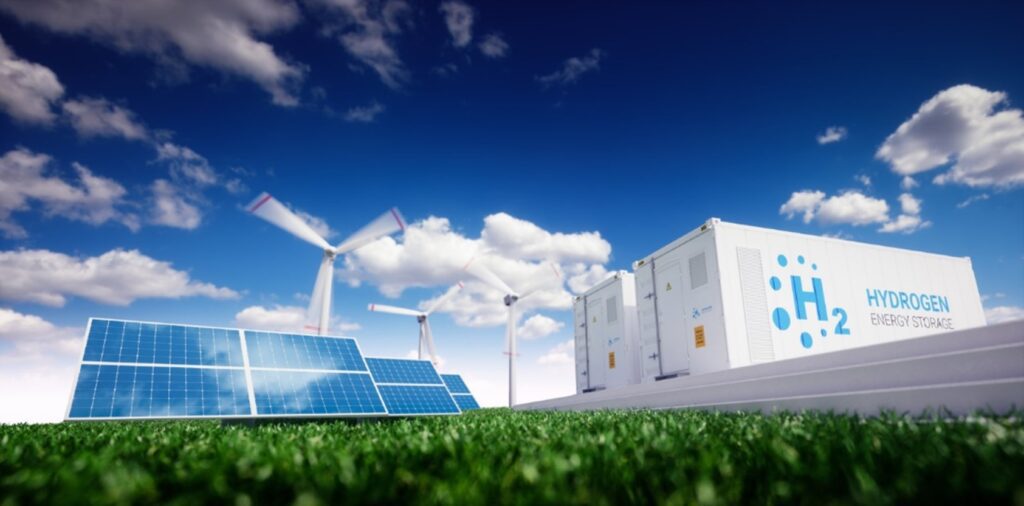
Hydrogen has been increasingly popular as an alternative energy source, especially as the world shifts towards sustainability. It is a versatile gas with multiple applications in mobility, industry, energy storage, power generation, or heating.
Hydrogen Production Methods for Sustainable Energy
Hydrogen is the most abundant element in the universe. The gaseous form of hydrogen is rarely found in high concentration and has to be produced from more complex molecules, like methane or water.
The widespread process relies on the reforming of natural gas, a fossil fuel composed of methane extracted from the underground. This process results in greenhouse gas emissions if the CO2 from the reaction is not captured.
However, new technologies are being developed to produce hydrogen with zero or low emissions, among which are:
- the electrolysis of water, powered by renewable energies like solar or wind,
- the use of biomethane instead of natural gas forreforming. Biomethane is renewable methane produced from organic waste,
- the biomass gasification,
- the capture and permanent storage of the CO2 from the natural gas reforming.
As technology continues to advance, producing hydrogen using these methods has become more efficient and cost-effective.
A Versatile Solution for Industrial Applications
Hydrogen can be used in a variety of industrial applications. For example, hydrogen can be used in refineries, chemical production, and metal processing. In these industries, it can be used as a feedstock or as a reducing agent, reducing the amount of emissions produced by these processes.
Hydrogen Energy Storage: The Missing Piece in the Renewable Energy Puzzle
One of the most exciting prospects for hydrogen is as a means of energy storage. While wind and solar energy are intermittent, hydrogen can be produced when the energy is available and stored for later use. This makes it a key player in the energy storage revolution.
Hydrogen can be stored in tanks or underground and then used to generate electricity when needed. This allows for the integration of renewable energy sources into the electricity grid. It can also be used to store excess energy from renewable sources, which can then be used during periods of low energy availability.
ENGIE: Leading the Way in Renewable and Low-Carbon Hydrogen
ENGIE has been working to develop a diverse portfolio of renewable energy solutions, including hydrogen. We want to leverage on our largest energy distribution network and storage capacity in Europe. Our objective is to advance these initiatives and achieve significant growth by the year 2030 with:
• 700 km of dedicated hydrogen pipelines
• 1 TWh of underground storage capacity
• Over 100 refueling stations and H2 facilities
• And 4GW of renewable hydrogen production capacity by 2035
Designed solutions for your business
Our recent partnership with Equinor is a result of the national hydrogen strategy in Belgium. The purpose of our work together is to develop production of low-carbon hydrogen from natural gas in Belgium through ATR technology combined with carbon capture and storage (CCS).
ENGIE’s hydrogen solutions are designed to help businesses and industries lower their carbon footprint and emissions. Whether you are looking to secure your carbon-free electricity, reduce the emissions of your processes, or generate your own hydrogen, ENGIE’s expertise can help you find the right solution.
ENGIE offers a range of solutions for businesses and industries looking to benefit from a competitive renewable and/or low-carbon hydrogen mix.
With a focus on co-creating low-carbon gas markets, ENGIE’s ambition is to connect supply and demand for hydrogen, ensuring that the right product is available at the right time, with quality, quantity and profile.

Diversifying Sustainable Energy Sources
While hydrogen has a lot of potential as a sustainable energy source, it is important to develop other renewable energy sources in parallel.
The decarbonization challenges are so high that the development of all renewable and low-carbon energies will be required. This is the case for biomethane, wind and solar, and should come after energy efficiency measures to first reduce energy consumption. Carbon capture technologies should also be developed.
In conclusion, hydrogen is gaining popularity as a versatile and sustainable energy source. Advances in production methods, including low or zero-emission technologies, make hydrogen more efficient and cost-effective. Its applications in industry, energy storage and power generation contribute to reducing emissions.
Companies like ENGIE are leading the way in renewable and low-carbon hydrogen projects. While hydrogen is promising, diversifying sustainable energy sources and developing carbon capture technologies are crucial. Hydrogen has the potential to play a significant role in our transition to a greener future.